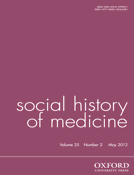-
Views
-
Cite
Cite
Mat Savelli, Diseased, Depraved or just Drunk? The Psychiatric Panic over Alcoholism in Communist Yugoslavia, Social History of Medicine, Volume 25, Issue 2, May 2012, Pages 462–480, https://doi.org/10.1093/shm/hkr116
Close - Share Icon Share
Summary
In the era of Communist rule in Yugoslavia (1945–91), few problems attracted as much psychiatric attention as alcoholism. Conducting widespread epidemiological research, practitioners discovered an alarming trend as rates of the disease were seemingly rising in every territory and segment of the population. Such an upswing of problem drinking seemed to threaten the ideological, economical, and social well-being of the state and its citizens. This widespread panic spurred psychiatric investigations into the aetiology of alcoholism. Much of this work focused on the role of the family, the workplace, class and societal changes as the genesis of problem drinking. Ultimately, these researchers concluded that alcoholism was not merely an affliction of the individual but rather a social disease with cause and consequence extending far beyond the problem drinker.




